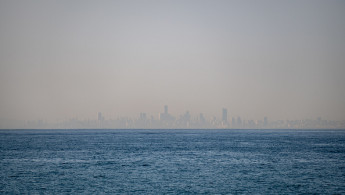Smog smothers Beirut at the start of Spring
A heavy cloud of smog smothered Lebanon's capital city of Beirut this week, with air pollutant levels reaching a high of 9.5 times the WHO recommended air quality index.
The smog is "seasonal" and a product of dust carried from deserts from neighbouring countries, Dr Najat Saliba, an atmospheric chemist and professor at the American University of Beirut, told The New Arab.
She added that Jordan and other regional neighbours were experiencing similar air pollution.
Beirut's air pollution is a constant problem, and smog hanging over the mountain-fringed port city is visible year-round.
"Beirut has a more or less constant average of 30 micrograms of fine particulate matter per cubic meter… which is six times higher than the annual average recommended by the WHO," Saliba said.
#Dust covering the #MiddleEast today causing lower air quality in many countries #Lebanon #Pollution #Beirut pic.twitter.com/VnMiHHYAcU
— Hadi Jaafar (@HadiHJaafar) April 6, 2022
Poor air quality can have an immediate effect on those suffering from chronic respiratory diseases, such as asthma. Over the long term, persistent pollutants can lead to health concerns such as cancer and decreased lung capacity.
The main cause of Beirut's worsening air quality is the widespread use of personal generators to power city residences, as well as the old age of vehicles in the city.
According to Dr Saliba, the average age of a car in Beirut is 19 years old – which is likely to persist given Lebanon's economic crisis.
Lebanon has suffered from an acute energy crisis over the past two years, with the national power grid providing only two-three hours of electricity a day.
Households, businesses and public institutions have turned to privately owned generators for electricity, consuming tons of diesel a week and throwing up fumes across the country.
I swear the pollution in Beirut is not okay its literally so obvious https://t.co/jrrr8fAomc
— yo (@CxrlxHxjj) April 5, 2022
"Generators are loaded with small particles which contain heavy metals and carcinogens. Long-term exposure to this is definitely linked to cancer. We have been exposed to these fumes for over 10 years, and that’s very bad," Dr Saliba said.
She added that a turn towards renewable energies, centralising power generation and creating more options for public transport are easily achievable and practical steps to lessen air pollution in Lebanon.
Despite continuing promises by the sitting Energy Minister that state power will increase soon, the national power company is continuing to be mired in inefficiency.
The national power company will reportedly struggle to keep the country's lights on during the 15 May elections next month.





 Follow the Middle East's top stories in English at The New Arab on Google News
Follow the Middle East's top stories in English at The New Arab on Google News


